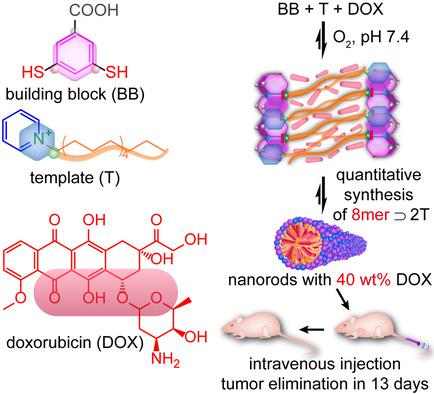当前位置:
X-MOL 学术
›
Angew. Chem. Int. Ed.
›
论文详情
Our official English website, www.x-mol.net, welcomes your
feedback! (Note: you will need to create a separate account there.)
Self‐Synthesizing Nanorods from Dynamic Combinatorial Libraries against Drug Resistant Cancer
Angewandte Chemie International Edition ( IF 16.1 ) Pub Date : 2020-10-28 , DOI: 10.1002/anie.202010937 Yu Cao 1 , Jian Yang 2, 3 , Dominik Eichin 1 , Fangzhe Zhao 2, 3 , Dawei Qi 1 , Laura Kahari 1 , Chunman Jia 4 , Markus Peurla 5 , Jessica M. Rosenholm 6 , Zhao Zhao 1 , Sirpa Jalkanen 1 , Jianwei Li 1, 4
Angewandte Chemie International Edition ( IF 16.1 ) Pub Date : 2020-10-28 , DOI: 10.1002/anie.202010937 Yu Cao 1 , Jian Yang 2, 3 , Dominik Eichin 1 , Fangzhe Zhao 2, 3 , Dawei Qi 1 , Laura Kahari 1 , Chunman Jia 4 , Markus Peurla 5 , Jessica M. Rosenholm 6 , Zhao Zhao 1 , Sirpa Jalkanen 1 , Jianwei Li 1, 4
Affiliation

|
Molecular self‐assembly has been widely used to develop nanocarriers for drug delivery. However, most of them have unsatisfactory drug loading capacity (DLC) and the dilemma between stimuli‐responsiveness and stability, stagnating their translational process. Herein, we overcame these drawbacks using dynamic combinatorial chemistry. A carrier molecule was spontaneously and quantitatively synthesized, aided by co‐self‐assembly with a template molecule and an anti‐cancer drug doxorubicin (DOX) from a dynamic combinatorial library that was operated by disulfide exchange under thermodynamic control. The highly selective synthesis guaranteed a stable yet pH‐ and redox‐ responsive nanocarrier with a maximized DLC of 40.1 % and an enhanced drug potency to fight DOX resistance in vitro and in vivo. Our findings suggested that harnessing the interplay between synthesis and self‐assembly in complex chemical systems could yield functional nanomaterials for advanced applications.
中文翻译:

动态组合图书馆针对耐药性癌症的自合成纳米棒
分子自组装已被广泛用于开发用于药物递送的纳米载体。但是,它们中的大多数药物装载能力(DLC)都不令人满意,并且刺激反应性和稳定性之间存在两难选择,使它们的翻译过程停滞不前。在本文中,我们使用动态组合化学技术克服了这些缺点。通过与模板分子和来自动态组合文库的抗癌药物阿霉素(DOX)共同自组装,自发和定量合成了载体分子,该文库是在热力学控制下通过二硫键交换操作的。高度选择性的合成可确保稳定的pH和氧化还原响应纳米载体,最大DLC为40.1%,并具有增强的体内外抗DOX耐药性的药效。
更新日期:2020-10-28
中文翻译:

动态组合图书馆针对耐药性癌症的自合成纳米棒
分子自组装已被广泛用于开发用于药物递送的纳米载体。但是,它们中的大多数药物装载能力(DLC)都不令人满意,并且刺激反应性和稳定性之间存在两难选择,使它们的翻译过程停滞不前。在本文中,我们使用动态组合化学技术克服了这些缺点。通过与模板分子和来自动态组合文库的抗癌药物阿霉素(DOX)共同自组装,自发和定量合成了载体分子,该文库是在热力学控制下通过二硫键交换操作的。高度选择性的合成可确保稳定的pH和氧化还原响应纳米载体,最大DLC为40.1%,并具有增强的体内外抗DOX耐药性的药效。











































 京公网安备 11010802027423号
京公网安备 11010802027423号